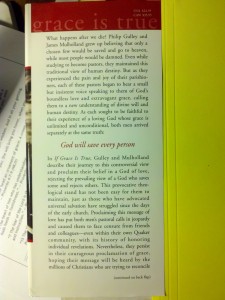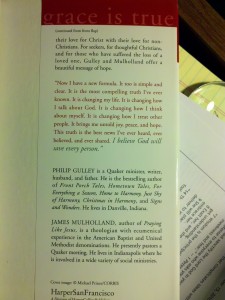Author Archive
To Law or Not To Law
The Christian faith and practice of every believer is based on certain Scriptures and passages having dominance or more importance in their beliefs and in the application of the Christian message to their life. (Although some believer’s faith and practice is not really based on their personal study of scripture, but on a denominational teaching to which they have subjected themselves.)
Many Christians can express what they believe, but are not necessarily able to explain why they believe it. It may have simply been a catchy phrase in a sermon which they adopted into their belief system. Christian cliches may be relevant to mature Christians, but they may be offensive to non Christians and they should not be the basis for teaching new Christians.
I think 2 Tim 3:16 “All Scripture is breathed out by God and profitable for teaching, for reproof, for correction, and for training in righteousness”, may be the most misunderstood and therefore misapplied and taught Christian Scripture.
The typical teaching/application of this passage is that all Scripture is intended to be applied to the Christian life in the same way that it was intended for the Jewish people and/or Gentiles to whom it was first given. See: The Jew and the Gentile Background of the Jew in the Old Testament | Bible.org. For instance, even though it is in the New Testament, Jesus, the Jew was preaching the Sermon on the Mount to his people. There were no New Covenant believers at that time to which it was directed.
Of course, If Christians know anything they know that they are not under the Law. The distinction between the Law and Grace is a prevalent sermon in all of Christendom. So teachers will say it is not a law for Christians, but it is an “example for us to live by” and since we now have the power of the Holy Spirit we can do it. Thus many denominations are taught a form of “legalism” that says we should live by the law as an example.
The trouble is, I don’t see any people understanding how to live the Law by the power of the Holy Spirit. Once you look at the Sermon on the Mount and many other passages as being an example to live by, you have just made the whole Bible a rule book for Christians. That is an attitude which is not good for the New Covenant believer, who is trying to learn how to live by the Spirit and love. John 13:34,35 We need to understand that the Law (obedience, duty, expectations) always speaks to the Flesh.
So we don’t need to think that all scripture is intended as a rule book for Christians. Read the Scriptures given to the Jews and about the Jews as God preparing the way for His New Covenant. This will give a new understanding of scripture to you. Scripture is all relevant and instructive to understand God’s plan of redemption, but we should not try to do what God was telling the Jews to do. Because God says, in His plan, things are going to change.
Ezekiel 36:26 “And I will give you a new heart, and a new spirit I will put within you. And I will remove the heart of stone from your flesh and give you a heart of flesh.”
In the New Covenant, the Christian learns to live by love of God and love of others, not by obedience.
Romans 13:8
“Owe no one anything, except to love each other, for the one who loves another has fulfilled the law. 9 For the commandments, “You shall not commit adultery, You shall not murder, You shall not steal, You shall not covet,” and any other commandment, are summed up in this word: “You shall love your neighbor as yourself.” 10 Love does no wrong to a neighbor; therefore love is the fulfilling of the law.”
Romans 8:4-6
4 so that the requirement of the Law might be fulfilled in us, who do not walk according to the flesh but according to the Spirit. 5 For those who are according to the flesh set their minds on the things of the flesh, but those who are according to the Spirit, the things of the Spirit. 6 For the mind set on the flesh is death, but the mind set on the Spirit is life and peace,
2 Corinthians 3:3-6
3 being manifested that you are a letter of Christ, cared for by us, written not with ink but with the Spirit of the living God, not on tablets of stone but on tablets of human hearts. 4 Such confidence we have through Christ toward God. 5 Not that we are adequate in ourselves to consider anything as coming from ourselves, but our adequacy is from God, 6 who also made us adequate as servants of a new covenant, not of the letter but of the Spirit; for the letter kills, but the Spirit gives life.
What we learn should not be what we are taught. “We learn something when we figure it out for our-self”. (Richard Feynman)
Copyright © 2014 Daniel R. Boliek www.gflstudy.org
If Grace Is True
From 30goodminutes.org “If Grace is True”
Twenty-two years ago I was called to pastor my first church: a small, rural Quaker meeting in the Midwest. We Quakers were musically challenged and had to draft a Baptist woman to play the organ. In addition to her musical talent, she possessed a keen radar for heresy. My second Sunday there, I said something in the sermon that caused her to be suspicious of my theology.
After meeting for worship, she approached and asked if I believed in hell. I told her no, I didn’t think so. I had dabbled in the history of religion enough to be suspicious of hell. No matter what church I attended, it was always the other people who were going there. Then she asked if I believed someone had to be a Christian to go to heaven. I told her that made no sense to me.
That afternoon, she began working the phones, calling the elders to report me, threatening to leave if I weren’t fired. Pastors are as common as starlings, while organists are a rarer breed, so her ultimatum caused much anxiety. After church, the next Sunday, the elders asked to meet with me and gave me the option of recanting or being fired. “Just say you believe in hell so we can get beyond this,” the head elder said.
I sat there wondering what I’d have to say the next time the church needed to get beyond something. Though I’d hoped to last longer than three weeks in my first pastorate, I couldn’t bring myself to affirm that woman’s vision of God and I was fired. I went out to the car where my wife was waiting.
“What happened?” she asked.
“Good news and bad news,” I told her.
“Tell me the good news first.”
“We get to sleep in next Sunday,” I said.
But word travels fast in Quaker circles and by that afternoon I’d been invited to speak at another meeting. It was a meeting with a reputation for theological rigidity and I wasn’t anxious to be their pastor. So I preached a sermon whose theme was the sentence, “If you can’t love homosexuals, you can’t love God.” I really didn’t want to work there.
Afterwards, they filed down the basement while I sat with my wife in the meeting room upstairs. I could hear them talking through the heating ducts. At one point, an elder tromped upstairs to ask me if I believed in hell. I told him no. He appeared somewhat shaken by that revelation, then hurried back downstairs to report my sacrilege to the others.
If Quakers voted, they never would have called me. But several persons pointed out that I was new to ministry and deserved an opportunity. Besides, I heard one man say through the heating duct, being new to ministry we won’t have to pay him very much. Well, that settled it. I was at that congregation four years. By the time I left, I believed in hell.
Years ago, I rejected the idea that God sends people who don’t believe the “right” things to hell. I didn’t do that with any sophistication. I couldn’t cite respected theologians or quote from the Bible. Hell just didn’t seem right. Because I was in a religious climate which discouraged questioning, I kept my convictions to myself. It took many years for me to share publicly what I believed privately: hell is killing us. The moral decline of a religion begins when it creates a hell, a place of punishment and torment where those who are different must go. As soon as religions create such places, they inevitably create the outsiders who go there, giving themselves tacit permission to do to them whatever they wish. Hell is killing us. It starts by killing our moral sensitivity. It ends, almost always, in the death of others.
I was speaking at a church this past winter. Afterwards a man approached me and said that as a progressive Christian he didn’t even believe in an afterlife. “I think the Church needs to stop talking about heaven and hell,” he said.
I wish we had that luxury. But when hell is killing us, the Church needs to talk about it.
So let’s talk.
Obedience & Love
GRACE, FAITH and LIFE
A Personal Statement of Christian Faith and Practice
Obedience can be an expression of Godly love, but, obedience cannot be the motivation for Godly love.
Acts of kindness performed as a duty are not necessarily love. (They may be simply a desire for self-improvement [achievement], to fulfill perceived expectations [duty] or for reward.)
or, with the proper attitude, they may be brotherly love.
Godly Love comes from a desire which God has put into your heart. Learning how love comes from God, is the essence of the Life which is promised in the New Covenant.
Matt 22:37-39 Mark 12:30-33 John 14:15, 21 John 15:9, 17 Rom 5:5 12:10 13:8-9 1Cor 13:1-13 Gal 5:6



 Code
Code
